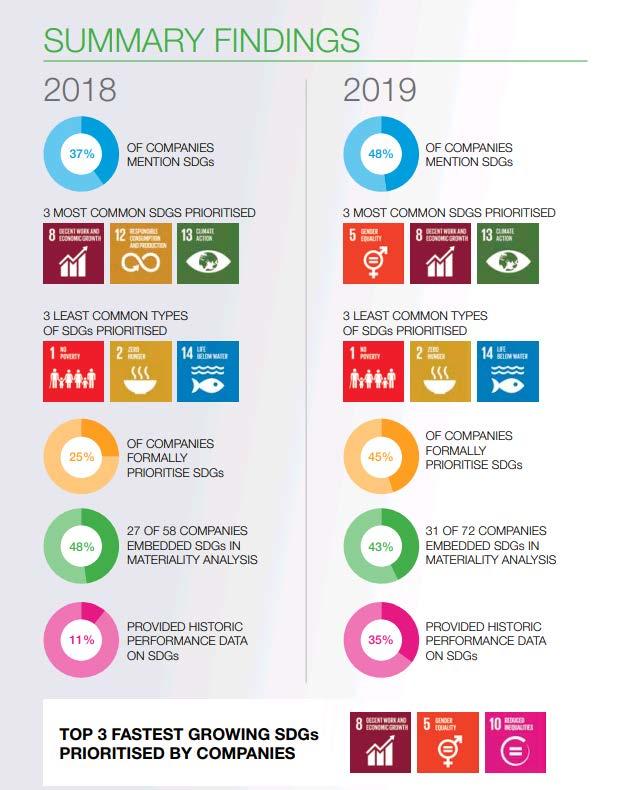
3 minute read
SDG Goals ASX150 companies need to improve their reporting on progress on SDGs
ASX150 companies need to improve their reporting on progress on SDGs
SDG Goals
Advertisement
The joint report by RMIT and UNAA about ASX150 companies and SDGs.
Many of the ASX150 – the top 150 publicly listed companies in Australia – have committed their organisations to the United Nations’ (UN) sustainable development goals (SDGs). However, it is difficult to measure their progress, according to a report by researchers from RMIT and the United Nations Association of Australia (UNAA). This is the second report completed as part of the collaboration between RMIT and the UNAA. There are 17 SDGs that Australia, along with 192 other member states of the UN, agreed to under the United Nations 2030 Agenda for Sustainable Development. These outline how we can create a more sustainable and equitable world, with goals including gender equality, ending poverty, climate action, quality education and reduced inequalities. The researchers assessed the corporate sustainability reports of the ASX150 to determine how they measure and disclose “their awareness of, commitment to and progress towards the sustainable development goals year-on-year”. “Businesses play a critical role in Australia’s progress towards sustainable development through the implementation of responsible business operations, developing innovative business models, making investments in sustainable technology and much more,” Professor Nava Subramaniam, lead author and Deputy Dean of Research and Innovation at RMIT’s School of Accounting, Information Systems and Supply Chain, said in a statement. The new report found that while more top listed Australian companies outlined a commitment to these goals between 2018 and 2019, only a few revealed measurable performance targets related to them. There were also very few companies providing context on changes put in place to address the goals. The number of companies disclosing their SDGs improved from 37 per cent in 2018 to 48 per cent in 2019. There was also an increase in the number of businesses revealing how they prioritised some of these goals, up from 25 per cent in 2018 to 45 per cent in 2019. But only a few companies link their business goals with SDGs, which makes it hard to identify how much progress is being made. Professor Subramaniam highlighted that not having standardised guidelines when reporting on these sustainability goals makes it hard to keep Australian companies accountable. “There are a number of reporting frameworks and guidelines including the GRI standards (Global Reporting Initiative [GRI] is an independent international organisation that has pioneered sustainability reporting since 1997) that companies can adopt for sustainability reporting,”
she said. “However, the voluntary nature of reporting and the lack of a systematic approach to linking business goals with the SDGs results in little to no consistency in SDG prioritisation and reporting across the board. “This report is a valuable resource for investors, regulators, managers and other stakeholders to understand how Australian businesses are embedding the SDGs into their organisations.

ASX150 companies on SDG reporting for 2018 and 2019. Source: SDG Measurement and Disclosure 2.0: A study of ASX150 companies.
“It also highlights the need for disclosing such information and provides insight into how businesses can better engage with the goals they identify as priorities for them.” The UNAA (NSW) Director of Strategic Partnerships, Ben Woltmann, said in a statement that Australia still has a way to go when it comes to reporting on sustainability compared to companies in Europe. While 48 per cent of ASX150 companies mention SDGs, 75 per cent of European companies report on their sustainability metrics. “With financial investment becoming increasingly linked to sustainability, it’s not just about our community anymore, it’s also smart business,” he said. Professor Subramaniam added that because SDG reporting by Australian businesses is in its infancy, now is a good time to agree on a framework and what best practice looks like, where everyone is accountable to the same standards. The report also highlighted the increasing disclosure requirements relating to risks associated with human rights, gender inequality, climate change and more faced by Australian companies. These requirements have been brought about by regulatory developments and initiatives such as Australia’s Modern Slavery Act 2018 and the Financial Stability Board’s Task Force on Climaterelated Financial Disclosure (TCFD). Many of these issues overlap with the SDGs and require Australian businesses to invest in reliable and effective sustainability reporting systems. * * * Read the full report: https://bit.ly/2QArDQW










